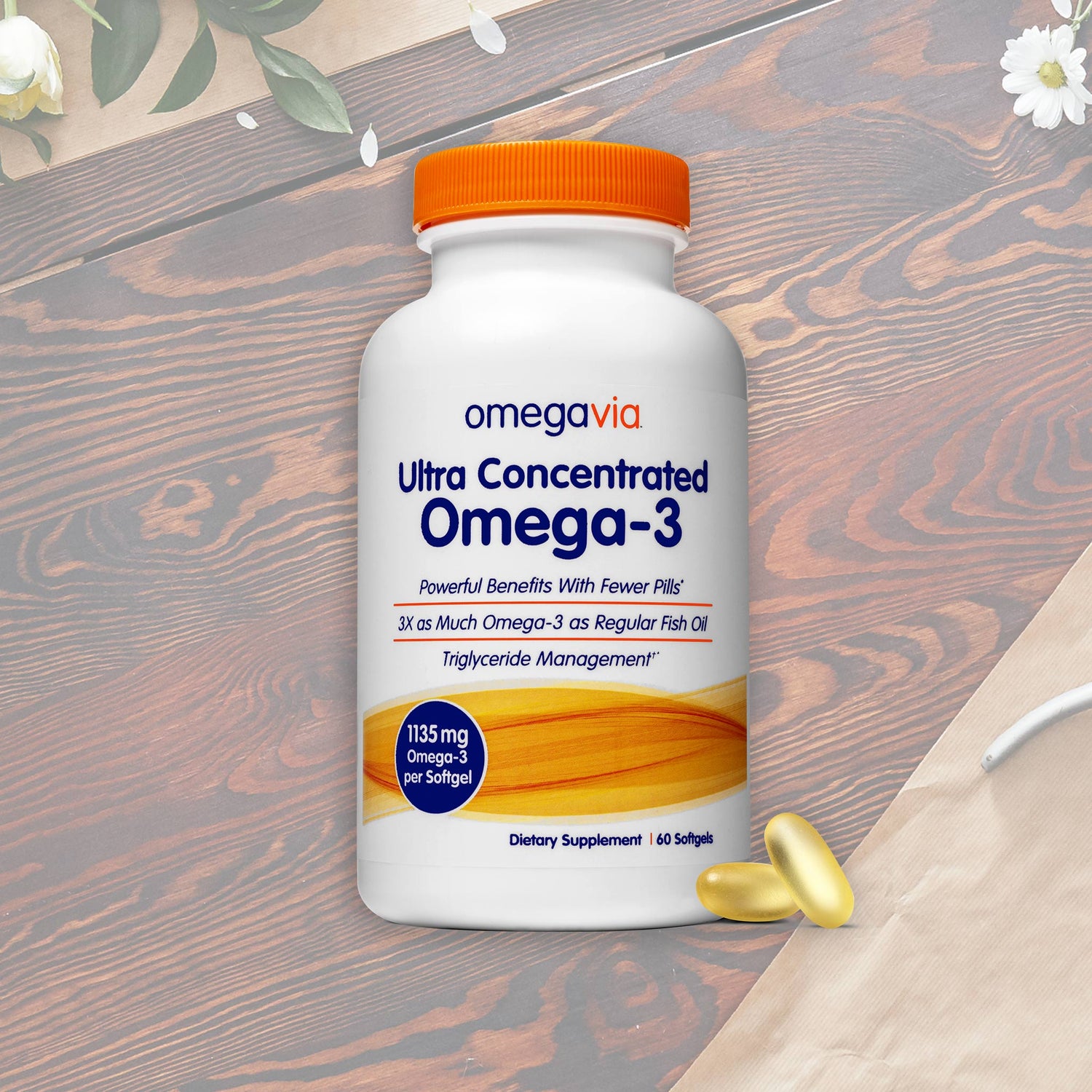Is Krill oil better than Fish oil?
Yes.
BUT!!
(You knew there was going to be a ‘but’…I'll explain below.)
It's all about Omega-3 absorption when you're comparing Krill oil vs Fish Oil.
The Omega-3 in Krill oil is better absorbed into your body than the Omega-3 from regular fish oil.
That’s a fact.
There are several
published scientific papers that prove it.
Krill Oil is definitely better.
NKO (Neptune) and Aker (Superba) Krill Oil have published clinical evidence of improved absorption and bioavailability.

I was in the audience when the Chief Scientific Officer from NKO presented the data at a conference in Las Vegas in 2009.
Krill Oil vs Fish Oil: Why is Krill Oil better?
Well, NKO has a patent to GENTLY remove Omega-3 from krill. This gentle process protects the delicate bond between the Omega-3 and phospholipid. Just like in fish oil, it’s the Omega-3 we’re interested in.
It’s the phospholipid bond that makes Krill Oil better than Fish Oil. You see, our cell membranes are also made of phospholipids. So Krill Oil takes to our cell membranes quickly and easily.
Fish oil makes it into our cell membranes too, but just not as well or easily.
Krill Oil vs Fish Oil: What about other Krill oils besides NKO?
Well, NKO has a patent for gentle extraction. So if anyone claims to make it as gently as NKO, they are breaking the law or doing something funny. Either way, nobody knows because no one else has published their results.
The reason why this gentle process is so important is that the phospholipid bond that makes Krill Oil superior is easily damaged by heat.
Once the phospholipid bond is damaged, then Krill oil is no different than fish oil. Actually, it'd be worse than fish oil.
Heat damaged Krill oil is just really expensive, red-colored oil.
How much better is Krill oil, really?
NKO’s science says that:
- Krill oil is 17% better absorbed than fish oil after 4 weeks
- And about 40% better absorbed after 8 weeks.
That’s really good!
Percent Omega-3 Change in Plasma
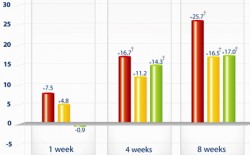
(The red bar is NKO Krill oil; green and yellow bars are fish oils)
Source: Evaluation of Omega-3 Bioavailability & Steady State Assessment of Neptune Krill Oil Compared to Established Omega-3 Formulations. Presented at SSW 2009.
What’s the catch?
The catch is the
cost and the
effective dosage.
NKO’s science says you need 1 gram of Krill oil at a minimum and 3 grams is best.
MegaRed is the most popular brand of Krill oil. So we'll use it as an example here.
Using MegaRed Krill Oil,
- 1 grams = 3 to 4 krill oil pills
- 3 grams = more than 10 pills
I know, MegaRed says you only need 1 little red pill a day. That’s just marketing. The published science says you need 3 to 4 pills a day. Scientists, by nature, are less likely to stretch the truth to make more money.
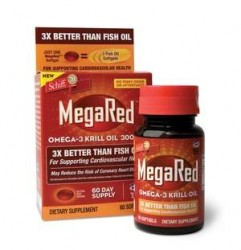
Let’s say you take 4 pills a day. That’s 120 pills a month.
Average price of a MegaRed pill is $0.45.
So you will need to spend $54 a month on MegaRed Krill oil.
That’s a lot. But worth it if it works for you.
You are ready for Krill Oil if...
|
|
Let’s say you bought a battery for $1. And then you saw a better battery that lasts TWICE as long…How much would you pay for the better battery?
a) $1
b) $2
c) $8
If you said $8, then you are ready to buy Krill Oil.
|
Why is Krill Oil So Expensive?
Because:
- Krill is caught in Antarctica, near the South Pole.
- Unlike fish, Krill must be caught and processed immediately on the ship. Or else it will go rancid. This process is very expensive.
- The harvest season is only a couple of months every year.
- Low capacity to process and purify oil.
- Someone must pay for expensive TV advertising.
Krill oil vs Fish Oil: Real World Comparison
Let’s compare MegaRed to a
Ultra-concentrated Fish Oil.
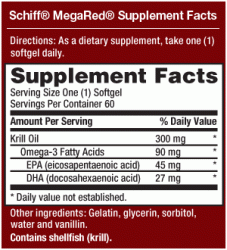
MegaRed contains
90 mg of Omega-3 per pill.
No, that was not a typo.
It contains only 90 mg of Omega-3 per pill. And it’s the Omega-3 in the krill oil that gives you the actual health benefit.*
There are a few good fish oil pills that provide 900 mg of Omega-3 in just one pill. Or 10X more Omega-3 per pill.
Let’s compare it with GNC’s Triple Strength Fish Oil with 900 mg of Omega-3 per pill.
It costs $26 for 60 pills. Or $0.43 per pill. Almost exactly the same as a MegaRed pill.
MegaRed = 90 mg
Triple Strength Fish Oil = 900 mg
But Krill oil is only 40% better absorbed. For the price, shouldn’t krill oil be 1000% better absorbed?
Forget Triple Strength Fish Oil – how about cheap, old fish oil from Walmart? Even that has 300 mg Omega-3.
Krill oil would have to be 300% better absorbed than REGULAR fish oil to equal the discount fish oil at Walmart, let alone ultra-concentrated or Triple Strength fish oil!
But it is only 40% better.
MegaRed and NKO Krill Oil
Now what if I told you MegaRed used to have NKO Krill oil. But not any more.

Now MegaRed uses another type of krill oil, with less published science. In 2009, MegaRed stopped using NKO Neptune Krill oil. They switched to Superba Krill oil.
I flew to Quebec, Canada to meet with the NKO folks at their headquarters. And last year, I also met with the Norwegian company that makes Superba krill oil.
I know why MegaRed changed krill oils but I’ll spare you the sordid details.
What does this mean to you, the consumer?
It means that MegaRed no longer uses krill oil with the most science behind it. Nobody has published a side-by-side absorption comparison between NKO and Superba oils.
Forget NKO and Superba for a second.
It Gets Uglier!
Because Krill oil is so popular, competition has come out of the woodwork.
You can now buy container loads of "Krill oil" from China and the Middle East. There are krill oils from strange places that may not actually be krill oil – they could be regular old fish oil with red algae extract for color and some soy bean phospholipids added to fool the Quality Control labs.
Percent Omega-3 Change in Plasma
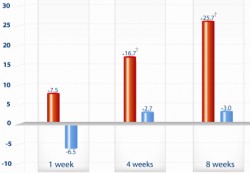
(The red bar is NKO Krill oil and the blue bar is a cheap store brand knock-off)
Source: Evaluation of Omega-3 Bioavailability & Steady State Assessment of Neptune Krill Oil Compared to Established Omega-3 Formulations. Presented at SSW 2009.
There are a lot of inferior, mysterious krill oil-like products out there. Every drug store and grocery store has its own store brand version of Krill oil. And my goodness, people are buying them!
'Store Brand Krill Oil' with unknown krill source is not quite as bad a scam as Bernie Madoff or Mortgage-backed Securities...but a LOT of uninformed consumers are being separated from their hard-earned money.
It's sad.
ConsumerLab.com weighs in...
|
On Oct. 1, 2010, ConsumerLab.com published its regular review of fish oils. This time, they added a few krill oils to their test.This is what they said:
"A krill oil supplement that failed for both spoilage and low omega-3 levels claimed to be quality assured under GMPs (good manufacturing practices). Another “krill oil” supplement contained more fish oil than krill oil."
|
Other Krill Oil Marketing Gimmicks:
“Contains Antioxidants.”
Sure, astaxanthin in Krill is a good antioxidant. But so are Vitamins C and E and they are dirt cheap. Astaxanthin can prevent sunburns after a month of use - other than that, it is no more special than many of the other special antioxidants.
“No fishy smell.”
Love this one.
Sure, there is no fishy smell. It smells like krill, not fish!
The astaxanthin found in Krill oil can act as an anti-rancidity (antioxidant) agent, but only if it is present in very high quantities. But the astaxanthin level is usually too low to protect krill oil from turning rancid.
Krill oil is one of the most sensitive oils to rancidity. Many Krill companies send me samples of their oil to review. After receiving complaints from employees, I no longer open these bottles inside the office. I now open these sample bottles in the parking lot while wearing gloves. And I usually walk to the dumpster before I return to my office.
Krill oil spoils MUCH faster than any fish oil I’ve worked with in the last 20 years. You can use 2 year old krill oil as stink bombs!
“Only 1 pill a day.”
Well, nothing wrong with just one pill a day. But if you want REAL health benefits, you need to take 3 to 4 pills.
“Three Times More Powerful Than Fish Oil.”
Well, MegaRed got in trouble with the Better Business Bureau’s National Advertising Review Council for saying that. The label has been changed now.
So back to our multiple-choice about the battery that lasts twice as long.
If you still buy Krill Oil, you are ready to pay $8 for a battery that lasts twice as long as a $1 battery.
Would you like to buy a Rolex, amigo?
Bottom-line:
The Phospholipid-bound Omega-3 in Krill oil is much better absorbed than the Omega-3 in fish oil. But you will pay way too much for that benefit.
You are MUCH better off taking
Ultra-concentrated fish oil.*
But I would switch to Krill oil in a heart beat if:
- I could get a 1000 mg Krill oil pill (instead of the 300 or 500 mg pills that flood the market)
- Get it for a slightly higher price than fish oil. I'll pay a little more for Krill oil...because it is 40% better absorbed.
But I'm not going to pay 5X or 10X more! That's crazy!
Don't miss the new blog entry:
Krill Oil vs Fish Oil - New Scientific Evidence
* These statements have not been evaluated by the Food and Drug Administration. This product is not intended to diagnose, treat, cure, or prevent any disease.
 I was in the audience when the Chief Scientific Officer from NKO presented the data at a conference in Las Vegas in 2009.
I was in the audience when the Chief Scientific Officer from NKO presented the data at a conference in Las Vegas in 2009.

 Let’s say you take 4 pills a day. That’s 120 pills a month.
Average price of a MegaRed pill is $0.45.
So you will need to spend $54 a month on MegaRed Krill oil.
That’s a lot. But worth it if it works for you.
Let’s say you take 4 pills a day. That’s 120 pills a month.
Average price of a MegaRed pill is $0.45.
So you will need to spend $54 a month on MegaRed Krill oil.
That’s a lot. But worth it if it works for you.
 MegaRed contains 90 mg of Omega-3 per pill.
No, that was not a typo.
It contains only 90 mg of Omega-3 per pill. And it’s the Omega-3 in the krill oil that gives you the actual health benefit.*
There are a few good fish oil pills that provide 900 mg of Omega-3 in just one pill. Or 10X more Omega-3 per pill.
Let’s compare it with GNC’s Triple Strength Fish Oil with 900 mg of Omega-3 per pill.
It costs $26 for 60 pills. Or $0.43 per pill. Almost exactly the same as a MegaRed pill.
MegaRed contains 90 mg of Omega-3 per pill.
No, that was not a typo.
It contains only 90 mg of Omega-3 per pill. And it’s the Omega-3 in the krill oil that gives you the actual health benefit.*
There are a few good fish oil pills that provide 900 mg of Omega-3 in just one pill. Or 10X more Omega-3 per pill.
Let’s compare it with GNC’s Triple Strength Fish Oil with 900 mg of Omega-3 per pill.
It costs $26 for 60 pills. Or $0.43 per pill. Almost exactly the same as a MegaRed pill.
 Now MegaRed uses another type of krill oil, with less published science. In 2009, MegaRed stopped using NKO Neptune Krill oil. They switched to Superba Krill oil.
I flew to Quebec, Canada to meet with the NKO folks at their headquarters. And last year, I also met with the Norwegian company that makes Superba krill oil.
I know why MegaRed changed krill oils but I’ll spare you the sordid details.
Now MegaRed uses another type of krill oil, with less published science. In 2009, MegaRed stopped using NKO Neptune Krill oil. They switched to Superba Krill oil.
I flew to Quebec, Canada to meet with the NKO folks at their headquarters. And last year, I also met with the Norwegian company that makes Superba krill oil.
I know why MegaRed changed krill oils but I’ll spare you the sordid details.


